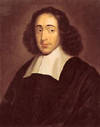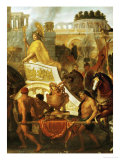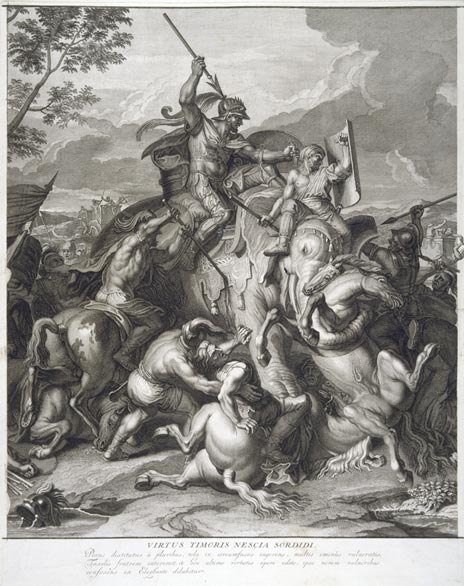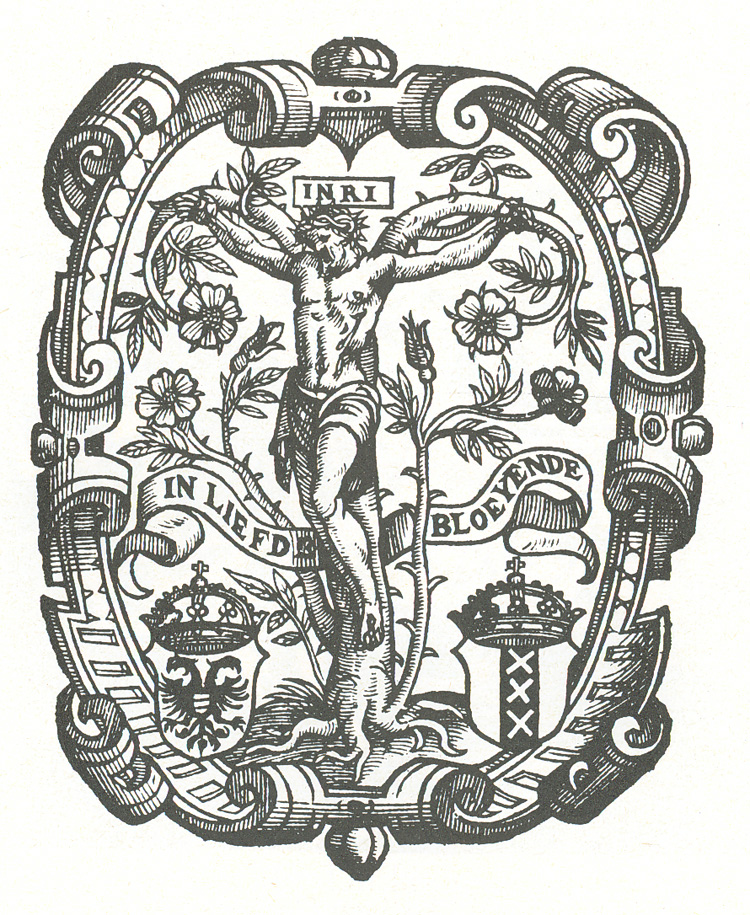Spinoza (1632-1677)
About his life
Baruch d'Espinoza is born in Amsterdam. 
He belongs to the sefardic-Jewish community, which bans him when he is 24. He changes his first name in Benedictus. As a sun of a merchant he than had already met some not-Jewish friends, with whom he keeps good contacts during his whole life. 
By them he gets contact with publisher Jan Rieuwertsz, who edits the works of René Descartes (1596-1650). In his times Descartes was very controversial and of caution he let parts of his work publish after his death. Spinoza's works too will be only published mainly only after his death by Rieuwertsz. This was made possible by a circle of trusted friends.
Critcs on bible and secular rulers /Theological Political Treatise
In the TPT from 1670 Spinoza shows that texts in the Bible in many places 'betrays the human spirit so much' that these can't be written by God. He considers them as 'inventions of the human fantasy', as superstition. Besides that, ecclestiatic authority does sometimes explain the texts as it suits them. Take the Fall. The Jewish religion does not know this. This raises the question: where in the Bible stands that man is sinfull by the Fall?
Preface TPT 5: 'Nothing rules the masses more effectively than superstition'. TPT 7 ‘So they fight for their own slavery as if it was for their salvation’.
 Secular rulers toot do present the people with religious ideas theat are not in their own interests but in that of their monarch. Louis XIV, the self-proclaimed Sun-King, preaised Alexander the Great as an example. Spinoza says in the TPT that Alexander the Great said to himself, let people think that it is worth to die for a ruler who is seen as the sun of God.
Secular rulers toot do present the people with religious ideas theat are not in their own interests but in that of their monarch. Louis XIV, the self-proclaimed Sun-King, preaised Alexander the Great as an example. Spinoza says in the TPT that Alexander the Great said to himself, let people think that it is worth to die for a ruler who is seen as the sun of God.  Charles le Brun, Louis XIV'th favorite painter made pictures of a Triumphing soldier above an enormous pile of dead bodies and horses. Without mentioning Louis XIV, Spinoza warns in his sketch of Alexander for The Sun King and his lust for power.
Charles le Brun, Louis XIV'th favorite painter made pictures of a Triumphing soldier above an enormous pile of dead bodies and horses. Without mentioning Louis XIV, Spinoza warns in his sketch of Alexander for The Sun King and his lust for power.
'Alexander the Great lets himself be greeted as the sun of Jupiter. As he himself says: “If Jupiter in his oracle calls me his 'son', it would be laughable not to take the name. Moreover I can use it by all I undertake. I wish Indians to believe too that I am a god.” In war ones reputation makes the difference. Often what had been wrongly believed gets the power of truth.’ ~ TPT 17,6
Love your neighbour and justice in the bible; democracy /TPT
Spinoza saw in the Bible that 'the prophets only learned very simple things, that everybody can understand and that they used a style of writing that suited the best to enable to bring the masses to devotion towards God'. Spinoza sees the visual stories about love for the neighbour and justice that are told by the prophets in the light of the ability of the people to comprehend. The stories contribute to peace and safety in the state. The best form of state is the one, in which independent people have most control themselves. That is, so he says in the TPT in 1670: democracy.
The TPT did not prevent the Netherlands of the invasion and the occupation until Utrecht of Louis XIV in 1672. Spinoza had to reconcile himself with the fact that a democracy, as had partly been the case in the period before in the Republic, was of the job for the time being. In the PT (1677) Spinoza discusses the 'best conditions' in forms of government including monarchy.
Spinoza in Amsterdam
 Spinoza lives his first 30 years in Amsterdam. Except of the rich influence of the jewish community, there was the cultural influence of the Rhetoric Chambers. The most influencial on cultural ànd scientific field was 'The Egelantine' (see for the mark left). They were carriers of the spirit of wanting to think for oneselves now the Bible could be read in the own language and of the Revolt against oppression of free thinking (the 80-years war againt the Spanish and Catholic church hierarchy).
Spinoza lives his first 30 years in Amsterdam. Except of the rich influence of the jewish community, there was the cultural influence of the Rhetoric Chambers. The most influencial on cultural ànd scientific field was 'The Egelantine' (see for the mark left). They were carriers of the spirit of wanting to think for oneselves now the Bible could be read in the own language and of the Revolt against oppression of free thinking (the 80-years war againt the Spanish and Catholic church hierarchy).
The 16th century D'Egelantine of Spiegel and Coornhert changed in the 17th century by poet and mayor-son P.C. Hooft in a direction of classical political theatre. Also there comes the influence of upcoming science, often in the seeking form of pansoft and alchemy.
Looking for the highest good/ On the improvement of the mind
A spiritual kinship with Coornhert and Spiegel can be deduced from Spinoza's youth work 'Treatise on the improvement of the mind'. Coornhert's biographer Becker calls Coornhert 'the apostle of perfectibility'. Spinoza presents in this work what he intends to do in his life.
'It is therefore important to think about what is the highest good', what brings the most resistant peace of mind with the value of the love of God. And to moderate other passions. The highest good which is to work with others to reach 'perfection'. This is the consciousness of the union of the mind with all nature.
'Therefore it is important to think about the 'highest good', what gives the most enduring piece of mind with the feeling of the 'love of God' and to moderate other passions. 'The highest good', that is to reach 'perfection' together with others. That is the consciousness of the unification of the mind with total Nature.
'Any way it is my purpose now to reach such a nature and to be committed that many reach her with me.
- to my felicity belongs toot that I pay effort to let many understand what I understand so that their understanding and desires are in agreement. And to make that possible it is nessecary to understand of nature as much as is required to attain a better nature. Next is necessary to form such a society as is required to able as many people as possible to give form to such a society as is necessary to reach that goal without effort' - Preface Treatise on the improviement of the mind, 14
Spinoza's goal is the freeing of imaginations not in the interests of the people. That do not lead to the top of possibilities in particular times and places. That in his terminology are 'inadequate'. 'Slavery'. Besides the improvements of these 'imaginations', is understanding the role of ones own emotions to understand and reduce the inner desire for false imaginings. To look after what gives happy emotions and avoid the sad ones, is basically consistent with our nature and consequently not bad. With reason one can control unnecessary fears.

